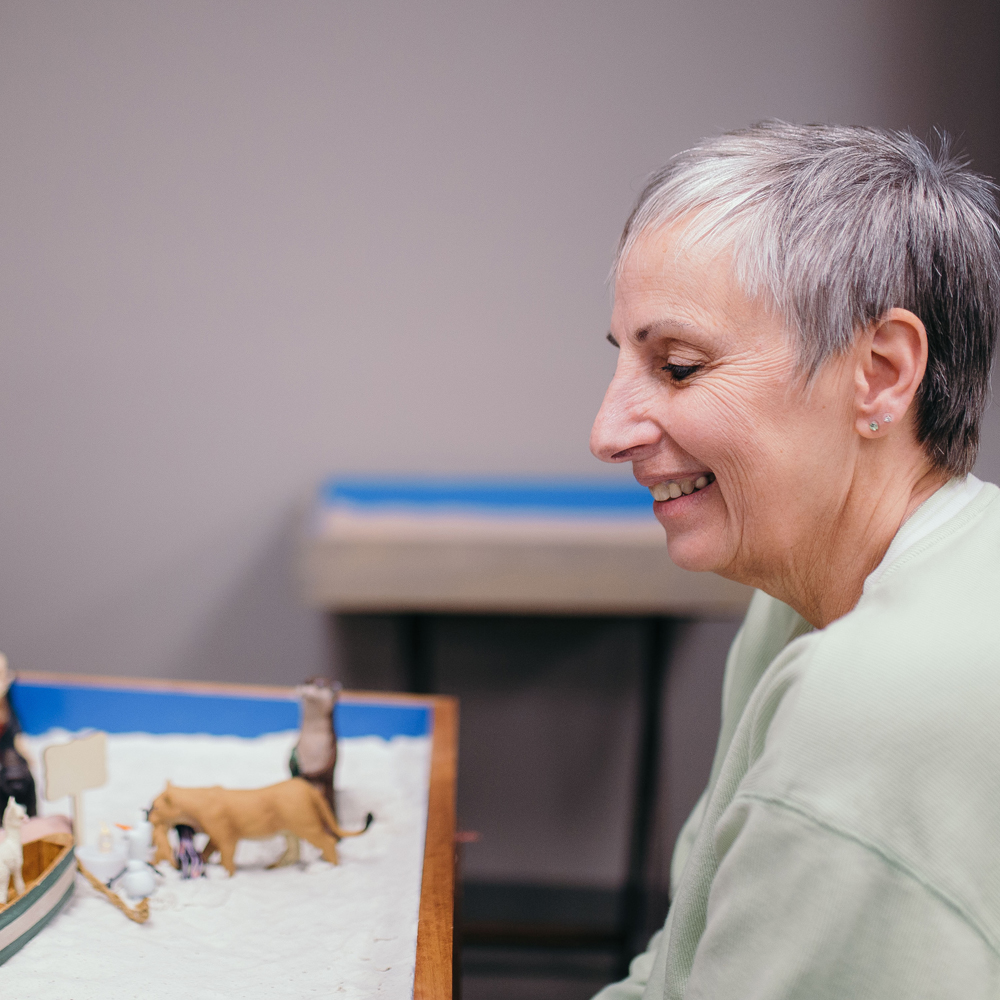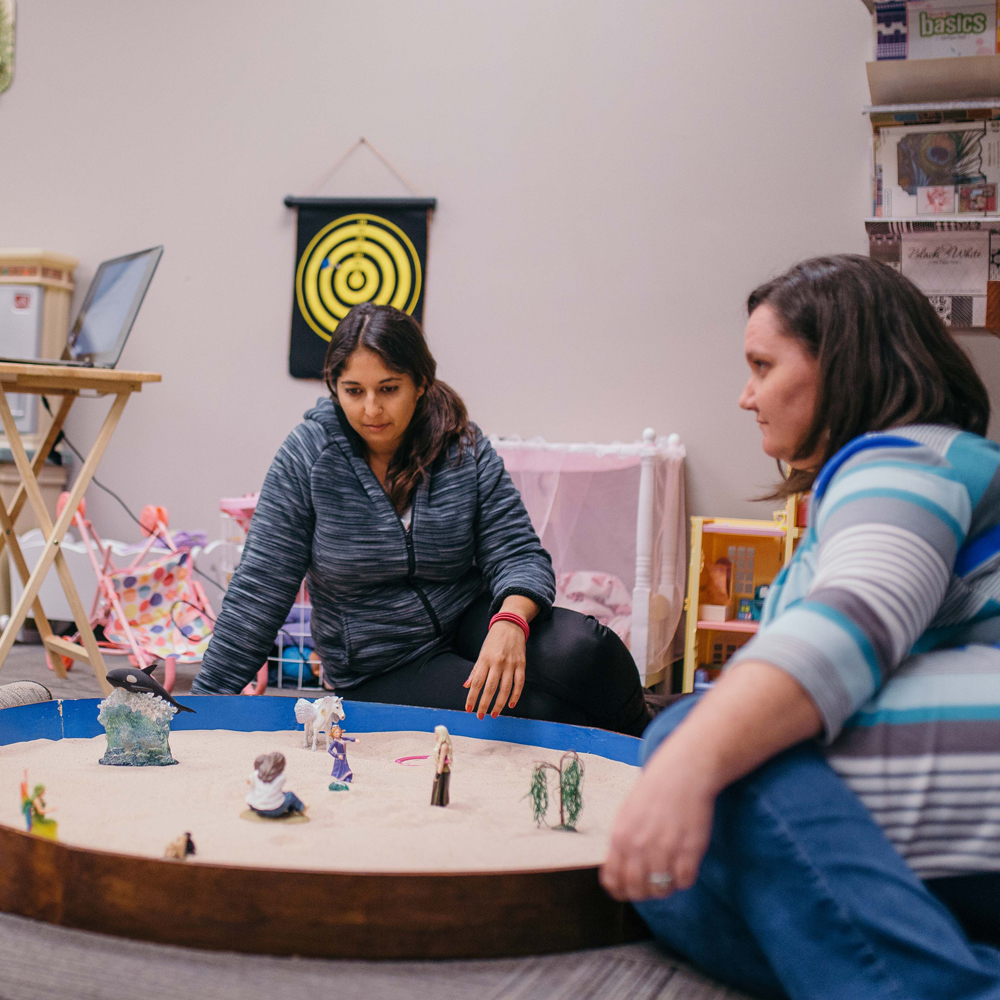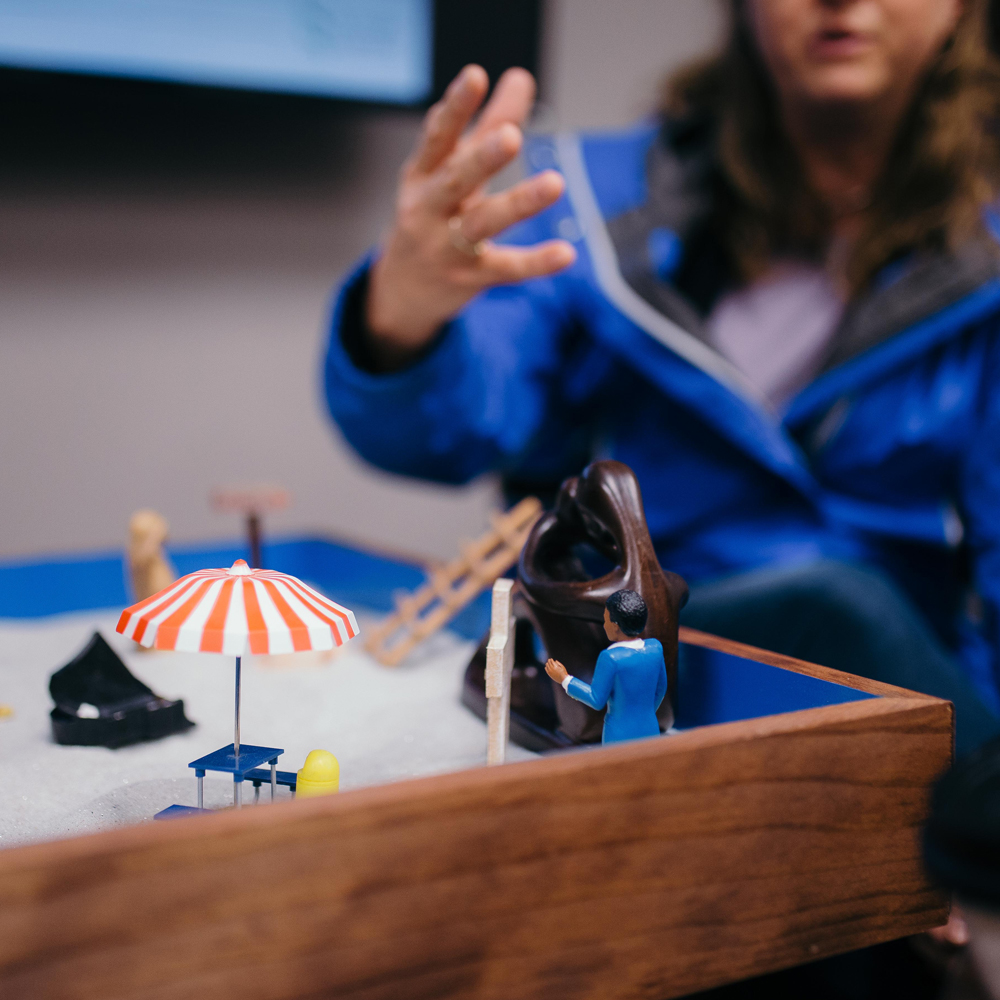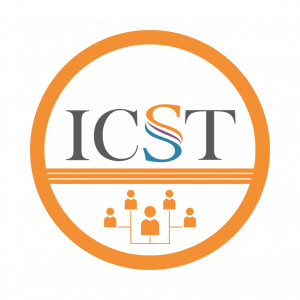Sandtray Credential Program
Internationally Credentialed Sandtray Therapist (ICST)
The ICST program is thoughtful, hands-on, collaborative and taught in a small group setting.
Through the ICST program, you won’t have any guesswork, you’ll get the complete system where we walk you through your deep-dive in sandtray therapy work.
But how does this work you ask?
The ICST program is a HYBRID program, where you train both in-person and online.
The in-person training will consist of 4 levels.
Each level takes 2 days of training qualify for NBCC hours (ACEP #6650). The ICST training levels are for those who are working as mental health therapists or in a graduate program concentrating on a discipline within the mental health field.
Levels 1 and 2 are taken in the spring, which center around the Introduction to Sandtray Therapy and learning all about the neuroscience behind the power of sandtray therapy.
Next, we’ll complete the online portion of the program, where we meet weekly for the 15 hours of case consultation with your group.
Levels 3 and 4 take place in the Fall. Within the last two levels, we concentrate on cleaning off your own mirror through the sandtray and honing your therapy skills as well as learning about what sandtray looks like with special populations

This workshop is an introductory class to sandtray work within the play therapy setting. It will cover how to work with both children and adults in sandtray as well as specific methods and techniques. There are 13 CE’s available for this level.
Day 1
Based on the content of this workshop, I am able to:
- Gain knowledge of the history of sandtray work in play therapy.
- Understand the difference between sandtray and sandplay therapy.
- Have a basic understanding of materials needed for this work, such as miniatures, sand, and sandtrays.
- Understand and develop skills needed to process sandtray with adults.
- List 20 directives for sandtray work in play therapy provided by the instructor and create others when given case examples from the instructor.
- Work through several case studies of adults and gain an understanding of the process that occurred within the treatment.
- Learn 10 themes in the sandtray, including those which indicate mental health concerns and healing.
Day 2
Based on the content of this workshop, I am able to:
- Have an overview of developmental issues that occur within sand tray work with children and other special populations.
- Gain a basic understanding of non-directive play therapy as how it relates to working with children in the sandtray.
- Understand and experience role play of sandtray work and experience a role play of how this occurs with children and sandtray.
- Work through several case studies of children and gain an understanding of the process that occurred within the play therapy treatment.
- Learn the latest brain-informed research behind the power of sand tray in play therapy.
- Experience a group sandtray and learn 3 ways that sandtray can be used in a group and family therapy setting.

This workshop is an advanced sandtray therapy class within the play therapy setting. It will cover the brain science behind sandtray therapy and how this relates to working with clients in the sand. There are 12 CE’s available for this level.
Day 1
Based on the content of this workshop, I am able to:
- Discuss knowledge of the basics of brain structure, especially in how this relates to play therapy.
- Identify the tenets of interpersonal neurobiology in a play therapy setting.
- Revise several case studies in terms of neuroscience integrating with play therapy.
- Explain how different ages work in the sand and play from a brain science perspective.
- Recite the effect of trauma on the brain and how this affects sandtray therapy.
- Apply 2 new techniques to help explain the brain structure to how working in the play and sandtray setting.
Day 2
Based on the content of this workshop, I am able to:
- Analyze the Polyvagal theory and how this relates to play and sandtray therapy.
- Interpret sandtrays based within brain science.
- Demonstrate the importance of implicit vs explicit memories within therapy and play.
- Practice skills to enhance your work as a facilitator of sandtray therapy.
- Implement the tenets of brain science research into your work in the sandtray.
- Recite the explanation of how sandtray therapy can be a form of play therapy from a brain-informed method, including the nine pathways of integration.

This class is a two-day advanced class for those seeking further training in sandtray methods used in play therapy. Personal work will be used to practice sandtray techniques. This workshop will be focusing on understanding one’s own journey as a way to further appreciate the client’s world. Participants are encouraged to bring favorite miniatures as well as a journal. Sand trays will be provided. There are 13 CE’s available for this level.
Day 1
Based on the content of this workshop, I am able to:
- Recite how the brain works through the sandtray and play therapy process.
- Discuss and review several personal case studies as well as those provided by the instructor within the play room.
- Discuss several case consolations provided by participants in the sandtray and play therapy room.
- Provide demonstration of personal work in the sandtray with the trainer and participants.
- Analyze 2-3 differing theories regarding the use of particular methods of sandtray work in the sand and play therapy
- Apply techniques in the sandtray and play therapy from both the client and therapist’s perspective.
- Identify 5-6 processing prompts appropriate for both children and adults in sandtray play therapy
Day 2
Based on the content of this workshop, I am able to:
- Analyze a live demonstration of the sandtray process and play therapy with a non-participant.
- Discuss demonstration using clinical tools learned in the sandtray process the previous day.
- Design 1-2 techniques to use in the sandtray therapy process from a particular theoretical orientation.
- Assess and critique personal processing skills in the sandtray while in pair exercises.
- Explain the importance of personal work within the sandtray as a tool to becoming an effective therapist through an experiential exercises.
- Discuss how to incorporate sandtray and play therapy into other models of therapy.
After completing the first three levels, you and your cohort will choose one of the three classes offered below to fulfill your level 4 requirement.
Doing this allows you to “choose your own adventure” and get what YOU need most out of your ICST experience.

This class is a two-day advanced class for those seeking further training in sandtray methods used in play therapy. Solution focused and directive work will be the focus of the training. Participants are encouraged to bring favorite miniatures as well as a journal. Sand trays will be provided. There are 12 CE’s available for this level.
Day 1
Based on the content of this workshop, I am able to:
- Learn the basic tenants of solution focused therapy used in play therapy room as well as general therapy.
- Discuss and review several personal case studies as well as those provided by the instructor within the play room.
- Discuss several play based solution focused techniques of discussing sandtray therapy.
- Provide demonstration of solution focused therapy in the sandtray and play therapy.
- Understand how solution focused theory play therapy can be used within the sandtray.
- Practice techniques in the sandtray from both the client and therapist’s perspective.
Day 2
- Review and further practice techniques in solution focused in the play room, such as the miracle question.
- Provide a detailed outline of what the solution focused module looks like in the play room and in therapy.
- Demonstrate how the 8 session module works with clients both in play room and in general therapy.
- Allow participants to work within the model as both the therapist and client.
- Provide feedback to participants about strengths/areas of improvement within processing of sandtray.
- Discuss how to incorporate solution focused play therapy into other models of working in the sandtray.

This workshop is an advanced sand tray therapy class within the play therapy setting. It will cover the how the brain changes in the adolescent years and how this relates to working with clients in the sand. By the end of the training, participants will gain the specific skills and knowledge listed below. There are 12 CE’s available for this level.
Day 1
Based on the content of this workshop, I am able to:
- Gain knowledge of the basics of the teenage brain structure, especially in how this relates to play therapy
- Learn the developmental tasks appropriate for a teenage brain
- Review several case studies with adolescents in the sandtray and play therapy
- Understand how to best work with adolescents in the sand and play therapy from a brain science perspective
- Identify the effect of trauma on the teenage brain and how this affects sandtray therapy
- Learn 5 new techniques to facilitate sandtray and play therapy with adolescents
Day 2
Based on the content of this workshop, I am able to:
- Learn the basis of how the adolescent works from an evolutionary perspective
- Learn to interpret adolescent sandtrays based within brain science
- Understand the how best to create collaborations when working with adolescents in sandtray and play therapy
- Practice skills to enhance your work as a facilitator of sandtray therapy, using what you have learned about how the adolescent brain works
- Create a better understanding of your own adolescent experiences using sandtray and play therapy practices

This class is a two-day advanced class for those seeking further training in sandtray methods used in play therapy. Nondirective play therapy methods will be discussed as well as how the sandtray is used with small children or non-verbal children. Participants are encouraged to bring favorite miniatures as well as a journal. Sand trays will be provided. There are 12 CE’s available for this level.
Day 1
Based on the content of this workshop, I am able to:
- Learn the history of play therapy with a focus on non-directive play therapy.
- Understand the research and evidenced based practices of non-directive play therapy.
- Review several videos of non-directive play therapy techniques.
- Provide demonstration of non-directive work in the sandtray and play therapy by instructor.
- Practice play-based techniques in the sandtray from both the client and therapist’s perspective.
- Review and further learn how these play-based techniques can be used in the sandtray.
Day 2
- Further review the brain informed methods of why play and sandtray therapy is not “just playing in the sand”.
- Case studies from instructor and participants regarding the use of play therapy techniques in the sand.
- Provide practice time with using play based techniques for participants, such as understanding without questions.
- Allow participants to work within the model as both the therapist and client.
- Provide feedback to participants about strengths/areas of improvement within processing of sandtray.
- Learn how and when to interpret work of the child in the play room and sandtray.
- Discuss how to incorporate the research of play therapy and brain research into working with small children.

This program is WAY more than just 4 classes- it’s a well-designed, life-changing experience.
Take a look below at what is included in this life-changing experience

All of my grads say the same thing…
“Amy’s ICST program is amazing and even a little bit addicting.”
So many of my students can’t wait for their next training. I’ve had few describe my course as the carrot that keeps them going.

Guess what? Many of my grads were sitting where you are right now, a little bit skeptical and wondering if this program is worth the investment and also wondering if it’s really as good as it sounds.
The answer is a resounding YES
So what can I expect?
Each level is provided in a small workshop format at my beautiful facility in Jonesboro, Arkansas. You’ll get time to rest and get what you need with instruction while allowing you time to connect with the other therapists and work on yourself as well.

Are you the ideal ICST student?
Only those who are committed to being the best, who are willing to try new things, and are able to look at themselves honestly in an effort to grow and improve need apply.


ICST Training Cohorts are Closed
Enrollment only happens once per year.
If you missed out, the next enrollment is January 2025!
2024 Dates and Information:
Cohort 1:
April 24-28, 2024
October 16-20, 2024
Cohort 2:
June 5-9, 2024
November 13-17, 2024
Location: 2605 Southwest Square, Jonesboro, AR 72401
Time: 8:30 am. – 4:00 pm each day
Only 12 spots are available per cohort for the Southern Sandtray ICST training for the sandtray credential.
Registration is now closed.






